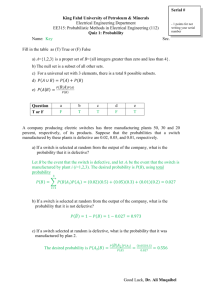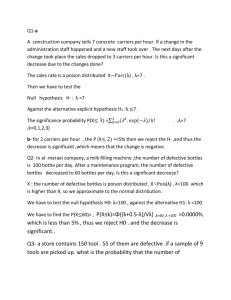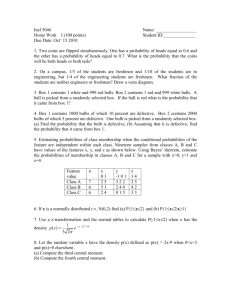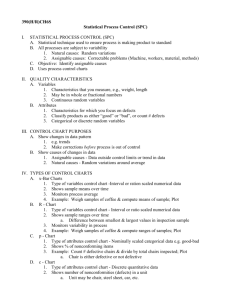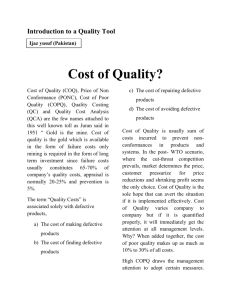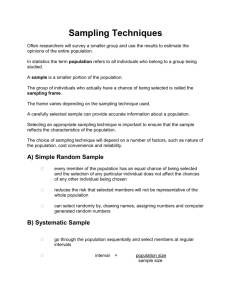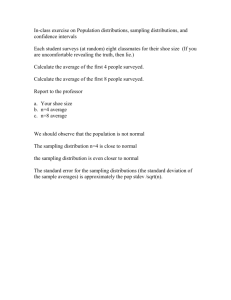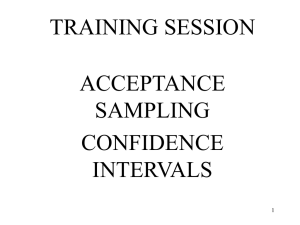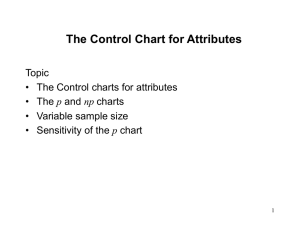QUALITY CONTROL AND SAFETY
advertisement
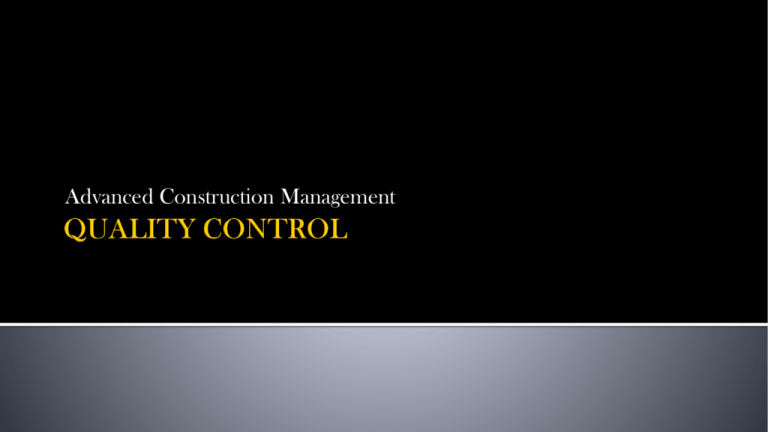
Advanced Construction Management Quality is the totality of features and characteristics of a product or service that bear on its ability to satisfy stated or implied needs. Some goals of quality programs include: Fitness for use. (Is the product or service capable of being used?) Fitness for purpose. (Does the product or service meet its intended purpose?) Customer satisfaction. (Does the product or service meet the customer's expectations?) Conformance to the requirements. (Does the product or service conform to the requirements?) Quality Planning Quality Assurance Quality Control The process of identifying which quality standards are relevant to the project and determining and how to satisfy them. Input includes: Quality policy, scope statement, product description, standards and regulations, and other process Output. Methods used: benefit / cost analysis, benchmarking, flowcharting, and design of experiments Output includes: Quality Management Plan, operational definitions, checklists, and Input to other processes. The process of evaluating overall project performance on a regular basis to provide confidence that the project will satisfy the relevant quality standards. Input includes: Quality Management Plan, results of quality control measurements, and operational definitions. Methods used: quality planning tools and techniques and quality audits. Output includes: quality improvement. Process of identifying or deciding all the quality requirements and guidelines or framework for a project Documents: QA Documents Quality assurance includes all the activities related to satisfying the relevant quality standards for a project Another goal of quality assurance is continuous quality improvement Benchmarking can be used to generate ideas for quality improvements Quality audits help identify lessons learned that can improve performance on current or future projects Tasks or activities performed in ground according to the quality guidelines or framework prescribed in the QA documents monitoring specific project results to ensure that they comply with the relevant quality standards while identifying ways to improve overall quality The main outputs of quality control are acceptance decisions rework process adjustments Some tools and techniques include pareto analysis statistical sampling quality control charts testing Was the project completed on time? Was the project completed within budget? Did the structure as well as the owner expectation? Is it stable ? common model :a group responsible for quality assurance and another group primarily responsible for safety smaller projects, the project manager or an assistant might assume these and other responsibilities Inspectors and quality assurance personal While the multitude of participants involved in the construction process require the services of inspectors, it cannot be emphasized too strongly that inspectors are only a formal check on quality control. Quality control should be a primary objective for all the members of a project team American Society for Testing and Materials (ASTM) American National Standards Institute (ANSI) SNI (Standard National Indonesia) American Welding Society Standard Specifications for Highway Bridges BINAMARGA (Indonesian Standard for Highway) Elevations and dimensions shown on plan within a tolerance of plus or minus 0.10 foot, and extending a sufficient distance from footings and foundations to permit placing and removal of concrete formwork, installation of services, other construction, and for inspection Traditional: specifications for asphalt pavement specified the composition of the asphalt material, the asphalt temperature during paving, and compacting procedures a performance specification for asphalt would detail the desired performance of the pavement with respect to impermeability, strength, etc. Concrete pavements of superior strength result in cost savings by delaying the time at which repairs or re-construction is required. In contrast, concrete of lower quality will necessitate more frequent overlays or other repair procedures Based on these life cycle cost considerations, a typical pay schedule might be Load Ratio Pay Factor <0.50 0.50-0.69 0.70-0.89 0.90-1.09 1.10-1.29 1.30-1.49 >1.50 Reject 0.90 0.95 1.00 1.05 1.10 1.12 AGE RATIO OF STRENGTH 3 0.45 7 0.65 14 0.88 21 0.95 28 1.00 90 1.20 365 1.35 Unforeseen circumstances Incorrect design decisions or changed by owner Some design rely upon informed insuring accurate and useful information is an important part of maintaining quality performance document control (including changes during the construction process), procurement, field inspection and testing, final checkout of the facility. Conform to elevations and dimensions shown on plan within a tolerance of plus or minus 0.10 foot, and extending a sufficient distance from footings and foundations to permit placing and removal of concrete formwork, installation of services, other construction, and for inspection This set of specifications requires judgment in application since some items are not precisely specified Quality control in construction typically involves insuring compliance with minimum standards of material and workmanship in order to insure the performance of the facility according to the design. For the purpose of insuring compliance, random samples and statistical methods are commonly used as the basis for accepting or rejecting work completed and batches of materials. Rejection of a batch is based on non-conformance or violation of the relevant design specifications An implicit assumption in these traditional quality control practices is the notion of an acceptable quality level which is a allowable fraction of defective items. Materials obtained from suppliers or work performed by an organization is inspected and passed as acceptable if the estimated defective percentage is within the acceptable quality level. Problems with materials or goods are corrected after delivery of the product In contrast to this traditional approach of quality control is the goal of total quality control. In this system, no defective items are allowed anywhere in the construction process. While the zero defects goal can never be permanently obtained, it provides a goal so that an organization is never satisfied with its quality control program even if defects are reduced by substantial amounts year after year. This concept and approach to quality control was first developed in manufacturing firms in Japan and Europe, but has since spread to many construction companies. The best known formal certification for quality improvement is the International Organization for Standardization's ISO 9000 standard. ISO 9000 emphasizes good documentation, quality goals and a series of cycles of planning, implementation and review. Total quality control is a commitment to quality expressed in all parts of an organization and typically involves many elements. Design reviews to insure safe and effective construction procedures are a major element. Other elements include extensive training for personnel, shifting the responsibility for detecting defects from quality control inspectors to workers, and continually maintaining equipment. Worker involvement in improved quality control is often formalized in quality circles in which groups of workers meet regularly to make suggestions for quality improvement. Material suppliers are also required to insure zero defects in delivered goods. Initially, all materials from a supplier are inspected and batches of goods with any defective items are returned. Suppliers with good records can be certified and not subject to complete inspection subsequently # Name Where Purpose 01 Cause & Effect Diagram (Ishikawa, Fishbone) Diagram showing an outcome and a list of potential causes (appears like a fish skeleton) • To illustrate how various factors might be linked to potential problems or effects • Used In Quality Planning (look forwards) and Quality Control (look backwards) • Help stimulate thinking, organize thoughts, generate discussion 02 Control Charts Graphical representation mapping process variables within acceptable limits; upper and lower control limits contain normal/expected variations; uses Rule of Seven to identify non random patterns • To determine whether or not a process is stable or has predictable performance • Data gathering • Special Cause identification / assignable causes • Shows Process behaviour over time • Shows if the process is under control v out of control 03 Flowcharting Diagram showing activities, decision point and sequence from beginning to end and interrelation of various elements • Can assist anticipation of problems and preventative action • Used In Quality Planning (look forwards) and Quality Control (look backwards) 04 Histogram (Bar chart) Bar Chart where Distribution of variables & height of column represent relative frequency. • Helps Identify Cause of the problem by the shape and width of the distribution 05 Pareto Chart (80-20 chart) (Histogram) Histogram order by frequency of occurrence, which shows how many defects regenerated by type or category of identified cause • • • • 06 Run Chart Line Graph showing data points plotted in the order in which they occur • Shows History and pattern of variation. Trend Analysis • Technical Performance (number of error/defects identified; number still uncorrected) 07 Scatter Diagram Diagram showing the pattern of relationship between two variables • The closer the points are to a diagonal line the more closely related they are; helps identify cause Identification of non-conformance Addressing root cause of the most critical problems Useful if there is little time available / prioritize Separates critical few from the uncritical many Exhaustive or 100% testing of all materials and work by inspectors can be exceedingly expensive, however. In many instances, testing requires the destruction of a material sample, so exhaustive testing is not even possible. As a result, small samples are used to establish the basis of accepting or rejecting a particular work item or shipment of materials. Statistical methods are used to interpret the results of test on a small sample to reach a conclusion concerning the acceptability of an entire lot or batch of materials or work products There are two types of statistical sampling which are commonly used for the purpose of quality control in batches of work or materials: 1. The acceptance or rejection of a lot is based on the number of defective (bad) or no defective (good) items in the sample. This is referred to as sampling by attributes. 2. Instead of using defective and no defective classifications for an item, a quantitative quality measure or the value of a measured variable is used as a quality indicator. This testing procedure is referred to as sampling by variables. Whatever sampling plan is used in testing, it is always assumed that the samples are representative of the entire population under consideration Consider a lot of finite number N, in which m items are defective (bad) and the remaining (N-m) items are non-defective (good). If a random sample of n items is taken from this lot, then we can determine the probability of having different numbers of defective items in the sample the probability of having exactly x defective items in the sample is given by the ratio as the hyper geometric series Suppose that the actual fraction of defectives in the lot is p and the actual fraction of no defectives is q Sampling by variables was developed for application to continuously measurable quantities of this type. The procedure uses measured values of an attribute in a sample to determine the overall acceptability of a batch or lot. Sampling by variables has the advantage of using more information from tests since it is based on actual measured values rather than a simple classification. As a result, acceptance sampling by variables can be more efficient than sampling by attributes in the sense that fewer samples are required to obtain a desired level of quality control. In applying sampling by variables, an acceptable lot quality can be defined with respect to an upper limit U, a lower limit L With both a lower and an upper limit on acceptable quality, the fraction defective would be the fraction of items greater than the upper limit or less than the lower limit In the application of sampling by variables plans, the measured characteristic is virtually always assumed to be normally distributed The normal distribution is likely to be a reasonably good assumption for many measured characteristics such as material density or degree of soil compaction. which is t-distributed with n-1 degrees of freedom With an upper limit, the calculations are similar, and the probability that the average value of a population is less than a particular upper limit can be calculated from the test statistic The calculations to estimate the fraction of items above an upper limit or below a lower limit are very similar to those for the population average. The only difference is that the square root of the number of samples does not appear in the test statistic formulas:
